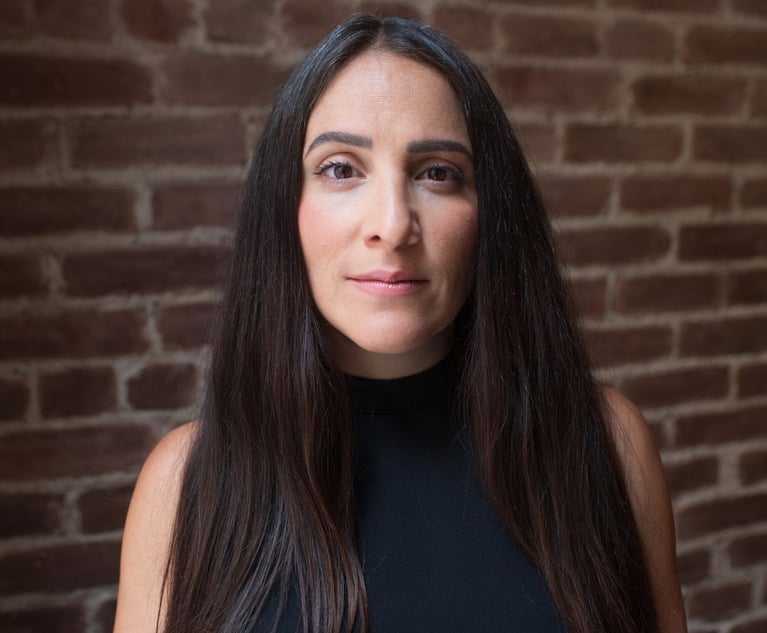African-American Law Prof Arrested During Traffic Stop Plans Civil Rights Suit
Kevin Brown, a professor at Indiana University Maurer School of Law-Bloomington, says he feels a responsibility to pursue accountability for police who abuse their power.
September 18, 2018 at 02:14 PM
6 minute read

Kevin Brown, a longtime professor at Indiana University Maurer School of Law-Bloomington, says he is preparing to file a civil rights lawsuit against a police officer who he says pointed a gun at him during a traffic stop after which he was handcuffed and arrested.
Brown, who is African-American, said his race was likely a factor in his aggressive treatment during the stop last fall. The Indianapolis police officer who made the stop, Emily Perkins, is the subject of an internal police investigation after she was recorded pepper-spraying patrons at an area nightclub earlier this month, and has been placed on administrative duty in connection with that incident. (The Indianapolis Metropolitan Police Department's legal advisor, Melissa Coxley, declined Tuesday to comment on Perkins' handling of Brown's traffic stop, citing the pending nature of the litigation.) Brown said the suit has been in the works for months but that the pepper-spraying incident prompted him to go public sooner than planned.
 Kevin Brown.
Kevin Brown.Brown was driving in downtown Indianapolis with his wife, Dianne, in October when Perkins pulled him over for allegedly speeding. Brown said he initially did not realize Perkins was trying to stop him, thinking she was trying to pass him, and that he drove for about 40 seconds as he looked for a safe place to pull over on the busy highway. Brown was arrested at the scene and charged with fleeing a police officer and resisting arrest—both charges were later dropped—and he and his wife were handcuffed on the side of a highway following the stop. Law.com talked with Brown to talk about why he is planning to sue, and what he says is his responsibility as a law professor to raise the alarm about the abuse of power by police, especially toward minorities. His answers have been edited for length and clarity.
Do you feel an added responsibility to pursue this claim because you are a law professor and you understand civil rights law?
Without question. I'm a law professor. My credibility is solid. But you take another black guy who has questionable credibility and all of a sudden he's stuck because the police are lining up saying one thing, and he's saying another.
That's part of what makes this so troublesome: She knew I was a lawyer. She had my bar card. I realized that if I can't bring light to this, I'm not doing my duty. I know there will be few people in Indianapolis with my credibility, to have this kind of run in with the police and who can do something about it. That's my main concern in doing all of this.
Tell me about this traffic stop.
[Perkins] gets out of her car, and I think she's going to thank me for pulling over into a safe place. But instead, she comes up with her gun drawn, screaming, “Why didn't you stop? Why didn't you stop?” I told her I was looking for a safe place, then I tell her I'm a law professor because I'm really nervous. She really seemed upset and very agitated. I wanted her to know that I'm not a threat. I gave her my bar card and I give her my license. She goes back to her car and two more patrolmen show up. She comes back and says, “Get out of your car. I'm going to handcuff you.”
You asked your wife to record the interaction on her cell phone, right?
This is a point in time where we're seeing a lot of coverage of police shooting of black males. As [Perkins] handcuffs me, she goes over to my wife, takes her cell phone, throws it in the car, and handcuffs her. Then we're both sitting on this guardrail in handcuffs. I told the two other officers, “Hey, look, this has never happened to me before. I'm clearly going to file a complaint for this kind of treatment.”
What happened after that?
They arrested me and took me to lockup. In Indianapolis, they are so overcrowded in lockup that people are typically there for two to three days before they see a judge. I actually got out in about 20 hours, but that's only because my wife stayed there the whole time, and my daughter, who is an attorney with Eli Lilly—a major corporation in Indianapolis—came down and stayed there the whole time. At one point, she ended up talking to the judge you go before to determine bond. Because of that, the judge pushed me up to get me out quicker. Otherwise, I probably would have been in jail for 48 to 68 hours.
Tell me about your lawsuit, which you plan to file in the coming weeks.
It's clearly going to be a civil rights claim. I don't know whether or not we will win on my case. Our attorney feels pretty confident about my wife's—that there was no reason at all to handcuff her and take her phone away from her and to prevent her from producing a record of what was going on. Mine will be about this excessive use of her power as a police officer. What we're hearing is that this officer is really a very bad actor. There is a real sense that she targets black people, and that she is somebody we are trying our best to see put off the force, or at least put in a position where she is not dealing with the public. To the extent I've ever met a police office where I said, “This is a person who might kill someone,” it's her. I thought that was a possibility on the night she stopped me.
How did it feel to be in that position, handcuffed on the side of the road?
For me, I didn't so much feel humiliated as I felt powerless. I particularly felt powerless about her putting the handcuffs on my wife. The second thing I felt was angry. When she first came to the car with the gun drawn—I've never have a gun pointed at me—I really felt afraid that she might actually pull the trigger.
But the main thing that really hit me was: I'm a law professor. I'm the longest-serving professor of color in the state of Indiana. She knows that if she can arrest me and send me to lockup, and knowing that people in lockup will be there a minimum of two days, maybe three of four, she knows the kind of power she has. That's ultimately what motivated me to file a civil lawsuit. If she can get away with what she has done to me, she knows she can do this to any black person to the state and there won't be any repercussions for her.
This content has been archived. It is available through our partners, LexisNexis® and Bloomberg Law.
To view this content, please continue to their sites.
Not a Lexis Subscriber?
Subscribe Now
Not a Bloomberg Law Subscriber?
Subscribe Now
NOT FOR REPRINT
© 2025 ALM Global, LLC, All Rights Reserved. Request academic re-use from www.copyright.com. All other uses, submit a request to [email protected]. For more information visit Asset & Logo Licensing.
You Might Like
View All
How I Made Practice Group Chair: 'Cultivating a Culture of Mutual Trust Is Essential,' Says Gina Piazza of Tarter Krinsky & Drogin

How I Made Managing Partner: 'Be the Uniting Voice of the Firm,' Says George Ogilvie of McDonald Carano

How I Made Managing Partner: 'Educate Yourself About Law Firm Economics,' Says Gregory Hessinger of Mitchell Silberberg

Cozen O'Connor's Bernard Nash Pioneered the Modern State AGs Practice. Now He's Hanging Up His Boots
6 minute readTrending Stories
- 1Data Breaches in UK Legal Sector Surge, According to ICO Data
- 2PayPal Faces New Round of Claims; This Time Alleging Its 'Honey' Browser Extension Cheated Consumers
- 3Fired NLRB Member Seeks Reinstatement, Challenges President's Removal Power
- 4NY Inspector General Announces Attorneys Hired to Lead Upstate Region and Gaming
- 5Carol-Lisa Phillips to Rise to Broward Chief Judge as Jack Tuter Weighs Next Move
Who Got The Work
J. Brugh Lower of Gibbons has entered an appearance for industrial equipment supplier Devco Corporation in a pending trademark infringement lawsuit. The suit, accusing the defendant of selling knock-off Graco products, was filed Dec. 18 in New Jersey District Court by Rivkin Radler on behalf of Graco Inc. and Graco Minnesota. The case, assigned to U.S. District Judge Zahid N. Quraishi, is 3:24-cv-11294, Graco Inc. et al v. Devco Corporation.
Who Got The Work
Rebecca Maller-Stein and Kent A. Yalowitz of Arnold & Porter Kaye Scholer have entered their appearances for Hanaco Venture Capital and its executives, Lior Prosor and David Frankel, in a pending securities lawsuit. The action, filed on Dec. 24 in New York Southern District Court by Zell, Aron & Co. on behalf of Goldeneye Advisors, accuses the defendants of negligently and fraudulently managing the plaintiff's $1 million investment. The case, assigned to U.S. District Judge Vernon S. Broderick, is 1:24-cv-09918, Goldeneye Advisors, LLC v. Hanaco Venture Capital, Ltd. et al.
Who Got The Work
Attorneys from A&O Shearman has stepped in as defense counsel for Toronto-Dominion Bank and other defendants in a pending securities class action. The suit, filed Dec. 11 in New York Southern District Court by Bleichmar Fonti & Auld, accuses the defendants of concealing the bank's 'pervasive' deficiencies in regards to its compliance with the Bank Secrecy Act and the quality of its anti-money laundering controls. The case, assigned to U.S. District Judge Arun Subramanian, is 1:24-cv-09445, Gonzalez v. The Toronto-Dominion Bank et al.
Who Got The Work
Crown Castle International, a Pennsylvania company providing shared communications infrastructure, has turned to Luke D. Wolf of Gordon Rees Scully Mansukhani to fend off a pending breach-of-contract lawsuit. The court action, filed Nov. 25 in Michigan Eastern District Court by Hooper Hathaway PC on behalf of The Town Residences LLC, accuses Crown Castle of failing to transfer approximately $30,000 in utility payments from T-Mobile in breach of a roof-top lease and assignment agreement. The case, assigned to U.S. District Judge Susan K. Declercq, is 2:24-cv-13131, The Town Residences LLC v. T-Mobile US, Inc. et al.
Who Got The Work
Wilfred P. Coronato and Daniel M. Schwartz of McCarter & English have stepped in as defense counsel to Electrolux Home Products Inc. in a pending product liability lawsuit. The court action, filed Nov. 26 in New York Eastern District Court by Poulos Lopiccolo PC and Nagel Rice LLP on behalf of David Stern, alleges that the defendant's refrigerators’ drawers and shelving repeatedly break and fall apart within months after purchase. The case, assigned to U.S. District Judge Joan M. Azrack, is 2:24-cv-08204, Stern v. Electrolux Home Products, Inc.
Featured Firms
Law Offices of Gary Martin Hays & Associates, P.C.
(470) 294-1674
Law Offices of Mark E. Salomone
(857) 444-6468
Smith & Hassler
(713) 739-1250








